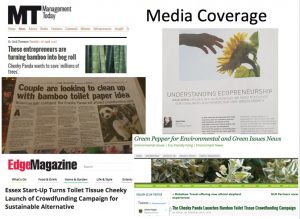In my role as an independent crowdfunding adviser I attend many live pitching events and meet plenty of people who have run successful crowdfunding projects. My 10 Top Tips are based on many meetings and conversations with people working at crowdfunding platforms and with entrepreneurs who have run successful crowdfunding campaigns, mainly equity based and some donations-for-rewards projects. This is intended more for commercial enterprises than fundraising for worthy causes, though many aspects would still apply.
- Examine projects by other crowdfunding users in your business sector.
- Build your own networks of relevant people for as long as possible before going live. Every person you have ever met is a potential backer! This crowd-building includes making professional media contacts to ensure a good response to press releases in your local area and sent to relevant trade/business sectors.
- Thorough planning and preparation is vital. Decide on who (the types of people) you want to tell about your offer; create in advance what you’re going to tell them (the content); plan when to tell them (don’t overload demands on your own time by telling everyone all at once, stagger it); decide which communications channels to use – social media, PR to secure media coverage, meetings and events, content marketing, paid-for advertising. You might want to start getting media coverage months in advance to allow time for items to be published so you can refer to them in your crowdfunding pitch.
- Pre-sell to your closest contacts and supporters so that you can count on at least 30% of your funding target or pre-orders arriving in the first few days. This gives the project vital momentum and encourages other would-be backers to get off the fence. Also check for opportunities through your crowdfunding platform (when your project is accepted by one) to identify and contact backers in their network with a relevant investment/product history.
- Ensure you and your partners/support team (a team of people is important because most crowdfunding attempts by a sole individual fail) have appropriate social media skills, or have a budget to access some.
- Crowdfunding can be a fulltime role. Why wouldn’t it be? Success is possibly going to transform your life for the better. Organise your day job, maybe by taking on temporary support, so you have the time to answer questions, send out information, and personally meet prospective backers. Don’t forget – people invest in people, get out and meet some would-be equity investors or people who could place large orders.
- Set weekly targets to monitor progress and check that you are doing enough, and establish what’s working well and what isn’t. Change your plans based on your weekly assessments to do more of what’s working best.
- Make it easy for your backers to tell their own networks about your crowdfunding project, provide them with content to use by email and in various social media formats.
- Be flexible to accommodate other opportunities that may arise, such as offers of retail distribution or interest from an angel investor.
- Invest some time on your new backers because they could turn in to important brand ambassadors for your business.
In short, you will need:
- soft ‘people skills’ and confidence to engage persuasively with potential backers;
- an ability to segment audiences and identify key prospects;
- skills to harness the power of the written word;
- social media skills;
- an easy-to-deliver and understand SMART business plan and financial projections (Specific, Measurable, Achievable, Realistic, Timetabled);
- a budget to bring in extra help and any skills or capabilities you lack within your immediate team (such as video production, effective use of social media, writing press releases, organising events);
- a campaign plan with KPIs to monitor progress;
- and maybe a campaign manager to help you hold it all together and make it work, if you think you need one.
 Or contact me, an independent crowdfunding adviser, at [email protected] or on 07788 784373. I can take you through a seven-stage assessment of your readiness to start crowdfunding and identify areas that ought to be strengthened before you go ahead. Then we can start planning how you will achieve success.
Or contact me, an independent crowdfunding adviser, at [email protected] or on 07788 784373. I can take you through a seven-stage assessment of your readiness to start crowdfunding and identify areas that ought to be strengthened before you go ahead. Then we can start planning how you will achieve success.





 If you are based in the UK and considering any form of crowdfunding to raise money for a business startup, to scaleup an existing business, or to use a crowdfunding platform as a sales channel for your products, then please get in touch if you’d like a free and confidential consultation with an independent crowdfunding adviser – which is me! Call 07788 784373 or send an email to
If you are based in the UK and considering any form of crowdfunding to raise money for a business startup, to scaleup an existing business, or to use a crowdfunding platform as a sales channel for your products, then please get in touch if you’d like a free and confidential consultation with an independent crowdfunding adviser – which is me! Call 07788 784373 or send an email to 
 Their eventual idea was to make tissue paper, and the first version was toilet rolls. This was a great choice, as tissue made from bamboo pulp rather than paper is stronger, softer, and naturally more hygienic. Their idea also had strong economic and ecological benefits: it would create work, benefit the local ecosystem to clear away some of the surplus bamboo being left to rot, and making tissue from bamboo produces a 65% lower carbon footprint than making it from trees or recycled paper.
Their eventual idea was to make tissue paper, and the first version was toilet rolls. This was a great choice, as tissue made from bamboo pulp rather than paper is stronger, softer, and naturally more hygienic. Their idea also had strong economic and ecological benefits: it would create work, benefit the local ecosystem to clear away some of the surplus bamboo being left to rot, and making tissue from bamboo produces a 65% lower carbon footprint than making it from trees or recycled paper. they amplified through their website and social media. They also courted relevant trade and professional media, and through a flexible content plan achieved coverage in Management Today and FMCG News (fmcg = fast moving consumer goods, a “must read” for anyone in the supermarket business) as well as local media in Essex, the Daily Mail and Huffington Post. I met Chris and Julie at an event at
they amplified through their website and social media. They also courted relevant trade and professional media, and through a flexible content plan achieved coverage in Management Today and FMCG News (fmcg = fast moving consumer goods, a “must read” for anyone in the supermarket business) as well as local media in Essex, the Daily Mail and Huffington Post. I met Chris and Julie at an event at  The fourth event in my sequence of five was a visit to The London Business Show 2016 at Olympia. Among hundreds of exhibitors and scores of seminar presenters I heard
The fourth event in my sequence of five was a visit to The London Business Show 2016 at Olympia. Among hundreds of exhibitors and scores of seminar presenters I heard 



































